Well, first things first—
 A Very (slightly ex post facto…) Happy Birthday to Sam Heughan! When he was first cast to play Jamie Fraser, I noted that he was born on April 30th, while Jamie’s birthday is May 1st—one on either side of the Beltane fire.
A Very (slightly ex post facto…) Happy Birthday to Sam Heughan! When he was first cast to play Jamie Fraser, I noted that he was born on April 30th, while Jamie’s birthday is May 1st—one on either side of the Beltane fire.
Beltane is the Celtic fire festival that marks the beginning of summer, so plainly a time of good omens. As it turned out, it was indeed a time of good omens for All Things Outlander, so it seems an appropriate time to offer up two bits of (what I assume will be) further Good News. One on either side of the fire, as it were…
The newly recorded audiobook of OUTLANDER, recorded by Kristin Atherton (the lovely actress who played the “mature” version of Jenny Murray in Season Seven), was released just yesterday, and I’m pleased to see that so many people already are excited about it and delighted with the quality.
(This in no way denigrates the wonderful Davina Porter, who has read all the Outlander novels, through GO TELL THE BEES THAT I AM GONE. Davina has retired, but all of her recordings will remain available, alongside the new ones.)
The Title of Book Ten
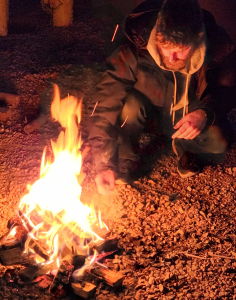 And on the other side of the fire (aka May 1st)… I thought I’d let you know what the title of Book Ten is (so we can stop calling it Book Ten, which is slightly boring…).
And on the other side of the fire (aka May 1st)… I thought I’d let you know what the title of Book Ten is (so we can stop calling it Book Ten, which is slightly boring…).
First, A Word of Warning: THE BOOK IS NOT FINISHED. IT HAS NO PUB DATE (because the publishers wisely won’t set one until they have the full manuscript in their eager hands).
I AM STILL WRITING IT.
YES, I DO KNOW HOW IT ENDS.
NO, I’M NOT TELLING YOU.
NO, YOU CAN’T ORDER IT YET, BECAUSE THE PUBLISHERS DON’T HAVE PAGES SET UP FOR ORDERS BECAUSE THERE IS NO PUB DATE AND BECAUSE I HAVEN’T TOLD THEM WHAT THE BOOK IS CALLED.
Until now. <ahem>
The title of Book Ten of the OUTLANDER series (and yes, this is the final book of the main series, though there may be other companion books and side stories, depending on how long I live…) is
.
.
.
.
.
.
.
.
[spoiler space for people who don’t even want to know the title, but couldn’t help reading this far]
.
.
.
.
A BLESSING FOR A WARRIOR GOING OUT
(NO, that doesn’t mean Jamie’s going to die. It’s not a death blessing, it’s the Blessing of St. Michael, said for a warrior about to go and do something important and possibly dangerous. There are quite a few people in this book who qualify for that blessing, believe me…)
It seems only reasonable to append a small sample from near the beginning of the book, but I know that not everyone wants to read bits and pieces, preferring to wait for The Whole Thing. Ergo, here’s another chunk of spoiler space:
.
.
.
.
.
.
.
.
.
.
.
.
.
[Excerpt from A BLESSING FOR A WARRIOR GOING OUT, Copyright © 2025 Diana Gabaldon]
Only a few people had noticed William’s arrival. The post-wedding revelry was well underway, and most of the guests were gathered in clumps near the food tables, talk and laughter rising and falling in volume as the wind shifted in the trees.
One of those who had noticed was Fanny, standing at my elbow.
“A Dhia,” she said faintly. Oh, God.
I couldn’t have put it better myself.
Jamie rose slowly from his chair on the porch—not using his stick, I saw—and drew himself up, eyes fixed on William.
William himself was still on his horse, the two of them mud-spattered, windblown and breathing hard. I saw his throat move as he swallowed, evidently preparing to repeat what he’d said a moment before.
Sir—I need your help.
But Jamie was moving, going down the steps. I could hear his left knee crack with each step, but he didn’t flinch or limp. He reached William and put a hand on his arm.
“You have it,” he said simply. “Come in.”
[end section]
William came up the steps after Jamie, his hat tucked under his arm. His face was still set in lines of anxious determination, but this relaxed for a moment when he saw me. He paused, and a tinge of warmth touched his eyes.
“Mother Claire,” he said. “I hadn’t—though clearly I should have—expected you.” His glance flicked past me, taking in the open doorway behind me, the fine, heavy door and the long, broad hallway beyond, lined with Brianna’s sketches and paintings.
“I know,” I said, smiling. “It gives you a bit of a turn, when you see someone out of place, so to speak.”
The corner of his mouth twitched briefly.
“So to speak,” he said, at once acknowledging and dismissing the circumstances in which he had been accustomed to seeing me: As Lord John’s wife. And as quickly as it had come, the warmth disappeared and his jaw set again. Jamie was waiting at the door of his study.
William had just set foot on the threshold when Fanny spoke behind him.
“Will-yum?” she said, her voice clear but uncertain.
He turned to look back, surprised, but then smiled and stepped back on the porch, reaching to take her hands.
“Frances,” he said softly, looking down at her. “There you are.”
“Here I am,” she said, smiling up. She’d blushed when he turned to her, but her brown eyes sparkled. “Shall I take care of your horse for you?”
“Oh.” He glanced down the steps; the horse, a big, muscular bay, was munching grass beside the path, his reins carelessly looped over the hitching rail. William glanced at me, and I made a tiny nod in Fanny’s direction.
“That’s most kind of you, Frances,” he said, and squeezed her hands briefly before letting go. “His name is Trajan and I’m sure he will be as grateful for your welcome as I am.”
She turned at once and skipped down the steps, glowing. William looked after her, the smile still on his face.
“I nearly said, ‘How you’ve grown, Frances!’,” he remarked, sotto voce, to me. “But that wouldn’t have done, would it? I always hated it when Papa’s friends would say that to me.”
“It would have gone over like a lead balloon,” I assured him. “She has, though. And her speech is nearly perfect now.”
I glanced over my shoulder; Jamie had gone into the study. “And—er—how is Lord John these days?”
“I wish I knew,” he said, face and voice both suddenly bleak. He took a deep breath and walked past me down the hall.
I didn’t know whether I ought to be present at whatever conversation he was about to have with Jamie, but neither of them had shut the door, so I walked quietly in and went at once to the cupboard where the visitor’s tray was kept, a plain pewter object, but equipped with several shot glasses, a bottle of fairly good whisky and a jug of water.
Jamie met my eyes but didn’t say anything as I set the tray down. He put a glass in front of William, poured a dram and said casually, “Aye, so?”
“It’s concerning my f— It’s Lord John, sir.”
“A Dhia,” Jamie said, with somewhat more force than Fanny had used. He drew a deep breath through his nose. “Where is he? And sit down, my lord,” he added, nodding to a chair.
“I don’t know.” William sat down, adding, “Don’t call me that,” then adding a hasty “if you please, sir,” as an afterthought.
Jamie raised one brow.
“Do ye ken where his lordship may be, Mr. Ransom?” he asked politely.
“No! Goddamn it, if I knew where he was, I would have got him back by now!”
The outburst startled us all, including William, who pressed his lips together.
“I beg your pardon, sir,” he said stiffly. “I—have been searching for… his lordship… for some time—for months. I am somewhat…” he made a brief gesture indicating emotional disturbance, lack of sleep and/or deep fear, and Jamie nodded.
“Dèrangè,” he said, in good French. “I expect so. I suppose it wouldna be helpful to ask where ye saw him last?”
“No,” William said dryly. He’d nearly got himself back under control, though, and helped the process along with a slug of whisky. “Though for what it”s worth, I last saw him in the drawing-room of his house in Savannah, on [date]. Later in the day, after I’d left, he received a written message, and whatever it said, it apparently caused him to go immediately to the docks. The cook told me. She was present when he got the message,” he added, “but she didn’t see what it said or whom it was from.”
“Did he tell the cook he was going to the docks?” I asked, and he shook his head.
“No. But he did go there. A whelk-seller on one of the quays said she’d seen a fair-haired man in a good coat, with a soldier’s queue, who’d asked her if there was a ship called “Palace” in the harbor.”
“But if you didn’t know he was going to the docks, why did you look for him there?” I took the bottle and poured a bit more whisky all round; this was clearly going to take some time.
Willie gave me a slightly odd look, as though he might ask me to leave the room, but instead took another mouthful and swallowed it.
“Are either of you familiar with a man named Percival Wainwright? Or, for that matter, the Chevalier St. Honorè?”
Jamie looked blank, but I felt a light, cold touch on the back of my neck, like the caress of a ghost.
“Yes,” I said. “Lord John mentioned him once or twice. He was John’s… step-brother, I think he said. His name isn’t Percival, though; it’s Perseverance. And—”
“Perseverance?” Jamie leaned forward, interested. “A Quaker, is he?”
William cleared his throat and looked down.
“Definitely not,” he said.
“He’s dead, though,” I told Jamie, and William looked up at me.
“He is now,” he said.
[end section]
Visit my A BLESSING FOR A WARRIOR GOING OUT webpage for information on this book, and to read more excerpts from it.
This blog entry was also posted on my official Facebook page on Thursday, May 1, 2025.
If you like, you may leave a web comment in the form below. I love to hear from readers. Note that your submission will be public, i.e., anyone on the World Wide Web can see and read it. All comments are moderated, which means that myself or my Webmistress approves them; your comment will not appear immediately as it would in social media. This may take a few hours or a few days. Thanks!
Posted on May 01, 2025 10:00 PM
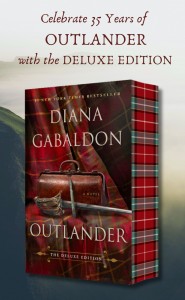 “Unrivaled storytelling. Unforgettable characters. Rich historical detail. These are the hallmarks of Diana Gabaldon’s work and the stunning story of Outlander. To celebrate thirty-five years of Outlander on our shelves, we are thrilled to announce a stunning new deluxe edition is hitting the shelves on September 29, 2026! This beautiful paperback will feature Fraser tartan edges, special cover effects, and a new letter of introduction from Diana herself.
“Unrivaled storytelling. Unforgettable characters. Rich historical detail. These are the hallmarks of Diana Gabaldon’s work and the stunning story of Outlander. To celebrate thirty-five years of Outlander on our shelves, we are thrilled to announce a stunning new deluxe edition is hitting the shelves on September 29, 2026! This beautiful paperback will feature Fraser tartan edges, special cover effects, and a new letter of introduction from Diana herself.
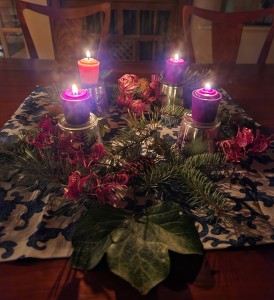 Sunday, December 21, 2025
Sunday, December 21, 2025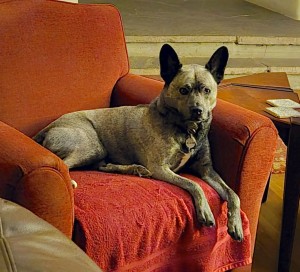

 In a comment on my Facebook page, Rene R. had a question:
In a comment on my Facebook page, Rene R. had a question: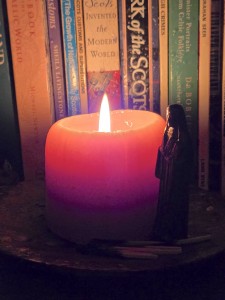 Ahhhhhhghhhhhhh, is more or less what’s in my mind, to be honest. Something went wrong with my password to my Facebook page, and I’ve been fighting@#$%@ Facebook to get it back for the last three or four days.
Ahhhhhhghhhhhhh, is more or less what’s in my mind, to be honest. Something went wrong with my password to my Facebook page, and I’ve been fighting@#$%@ Facebook to get it back for the last three or four days.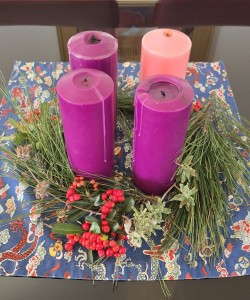 Today/Tonight is the Second Sunday of Advent, and the candle for this Sunday is usually called “Peace”. In the winter season, the world seems to turn more slowly, and the nights grow longer, lending us a quiet space in which to think, to pray, or only be.
Today/Tonight is the Second Sunday of Advent, and the candle for this Sunday is usually called “Peace”. In the winter season, the world seems to turn more slowly, and the nights grow longer, lending us a quiet space in which to think, to pray, or only be.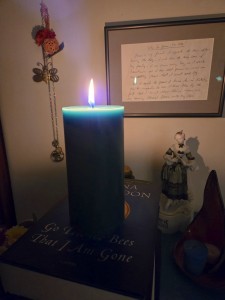 Today/Tonight is the First Sunday of Advent. Tonight’s candle is usually called “Hope”—though it’s also called “The Candle of Prophecy” in some circles. Regardless of name, our purpose is to turn away from the Dark—to let discord, fear, violence and sadness vanish like dry leaves in the flame of our hearts, that hope may rise with the quiet light.
Today/Tonight is the First Sunday of Advent. Tonight’s candle is usually called “Hope”—though it’s also called “The Candle of Prophecy” in some circles. Regardless of name, our purpose is to turn away from the Dark—to let discord, fear, violence and sadness vanish like dry leaves in the flame of our hearts, that hope may rise with the quiet light.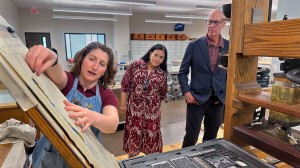

 The organizers searched high and low for another hotel, but nothing was available that would fit a conference of this size, where most of the attendees stay -in- the hotel throughout the conference.
The organizers searched high and low for another hotel, but nothing was available that would fit a conference of this size, where most of the attendees stay -in- the hotel throughout the conference. The SiWC is run by a non-profit foundation—meaning that one year funds the next, but there’s not a lot left over—and in this case, it means that the organizers have a $300,000 loss, which will need to be rebuilt in order for next year’s conference to happen.
The SiWC is run by a non-profit foundation—meaning that one year funds the next, but there’s not a lot left over—and in this case, it means that the organizers have a $300,000 loss, which will need to be rebuilt in order for next year’s conference to happen.
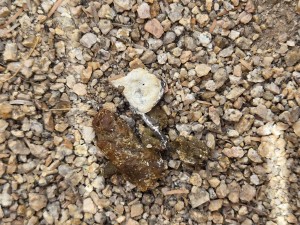 What’s on my mind? Hmmm…. Well, I was reading through a chunk of ABFAWGO (hey, at least it’s a pronounceable abbreviation. If you want to call the book BLESSING or WARRIOR, though, fine by me…), and came to this sentence:
What’s on my mind? Hmmm…. Well, I was reading through a chunk of ABFAWGO (hey, at least it’s a pronounceable abbreviation. If you want to call the book BLESSING or WARRIOR, though, fine by me…), and came to this sentence: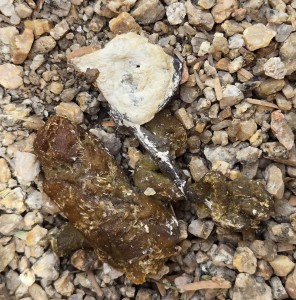 I realize y’all think I must live in a snake pit, and I admit that it’s been an unusually active spring in terms of the local inhabitants of the Suborder Serpentes, but I very seldom encounter noticeable excreta, and this is a particularly fine specimen, as it clearly shows the odd nature of snake excrement: to wit, snakes don’t have anuses. Nor do they have bladders. They have one opening (called the cloaca), through which they do all their business, including sex and giving birth.
I realize y’all think I must live in a snake pit, and I admit that it’s been an unusually active spring in terms of the local inhabitants of the Suborder Serpentes, but I very seldom encounter noticeable excreta, and this is a particularly fine specimen, as it clearly shows the odd nature of snake excrement: to wit, snakes don’t have anuses. Nor do they have bladders. They have one opening (called the cloaca), through which they do all their business, including sex and giving birth. A Very (slightly ex post facto…) Happy Birthday to Sam Heughan! When he was first cast to play Jamie Fraser, I noted that he was born on April 30th, while Jamie’s birthday is May 1st—one on either side of the Beltane fire.
A Very (slightly ex post facto…) Happy Birthday to Sam Heughan! When he was first cast to play Jamie Fraser, I noted that he was born on April 30th, while Jamie’s birthday is May 1st—one on either side of the Beltane fire. And on the other side of the fire (aka May 1st)… I thought I’d let you know what the title of Book Ten is (so we can stop calling it Book Ten, which is slightly boring…).
And on the other side of the fire (aka May 1st)… I thought I’d let you know what the title of Book Ten is (so we can stop calling it Book Ten, which is slightly boring…).